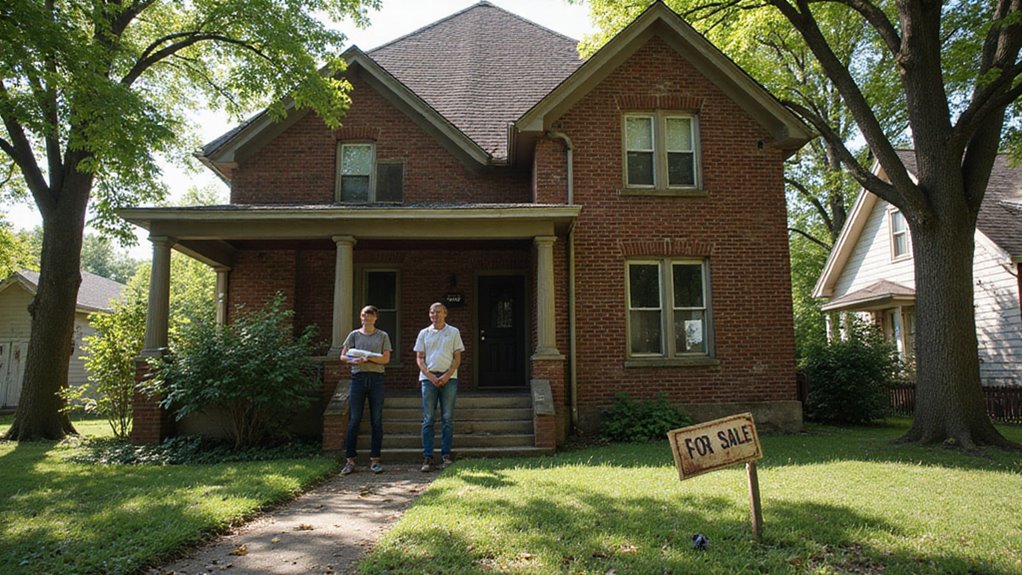Selling an Inherited House in Cincinnati




Inheriting a house in Cincinnati can quickly become overwhelming. You must deal with probate, determine the property’s value, and handle repairs. Many people feel lost when selling an inherited home.
These challenges often cause stress and delays. Family members may disagree, and legal rules can be confusing. The process can drag on for months without clear guidance.
You can sell an inherited house in Cincinnati smoothly by understanding the process and taking smart steps. This guide will show you how to make good decisions and protect your interests. You can avoid common pitfalls with the right information.
This blog will help you solve the issues around selling an inherited house in Cincinnati. Keep reading for clear steps and tips. You’ll feel more confident and prepared.
Table of Contents
Understanding Inherited Property Rights

Before you sell an inherited house in Cincinnati, you’ll need to understand how local inheritance laws and the probate process affect your rights as a new owner. Ohio’s statutes determine who can legally inherit property and what steps you must complete before transferring ownership. Knowing these details helps you avoid legal setbacks and ensures a smoother sale.
Cincinnati Inheritance Laws
Cincinnati inheritance laws decide how property passes after someone dies. If there is a will, named heirs usually receive the property. Without a will, state intestate succession rules determine who inherits.
Estate planning tools can affect ownership changes. You should check for trusts, joint tenancy, or transfer-on-death deeds. These documents may change how and to whom the property transfers.
Ohio does not have a state inheritance tax. However, heirs must pay any unpaid property taxes. Federal estate taxes may apply if the estate is large.
Understanding these laws helps you manage an inherited house correctly. If you follow the right steps, selling the property is easier and safer. This prevents legal issues in the future.
Probate Process Overview
The probate process decides your legal ownership of a house you inherit in Cincinnati. Probate is a court process that checks the will and manages the estate. If you are an heir, you must follow each step to claim your property.
First, the will is filed with the local probate court. The court then sends notice to all heirs and creditors. If someone disputes the will, the process may take longer.
Next, the estate’s assets, including the house, are listed and valued. The court checks debts and handles any disagreements. If all debts are paid, the court allows the property transfer.
If you understand these steps, you can prepare for possible delays or issues. Knowing the process helps protect your rights as an heir. If you have questions, you should speak to a probate attorney.
How to Sell an Inherited House in Cincinnati
When you’re ready to sell an inherited house in Cincinnati, you need to gather the right documents, evaluate tax consequences, and coordinate with any co-heirs. It’s critical to understand each step, from clearing the title to setting an accurate market price.
By approaching these details methodically, you’ll streamline the process and protect your interests. Before you sell an inherited house in Cincinnati, you need the right documents. These records show you own the property and have legal authority to sell. If you do not have them, the sale could be delayed or stopped.
Title deeds prove you own the house and show its history. Probate documents from the court give you permission to act as executor or administrator. A death certificate is necessary to start the probate process and transfer the title. Inheritance tax records confirm all taxes are paid. These documents help prevent legal problems during the sale. If you prepare everything early, the selling process will go more smoothly.
Tax Implications of Selling Inherited Property
Dealing With Multiple Heirs
Setting the Right Price
Selling an inherited house in Cincinnati has tax implications. You may not owe Ohio inheritance tax, as Ohio does not have one. However, federal estate taxes can apply if the estate is very large.
The property’s value resets to its fair market value when you inherit it. You only pay capital gains tax on the increase in value after you inherit the property. If you sell the house for more than this value, you may owe taxes on the profit.
Consulting a tax professional helps you follow the rules and avoid mistakes. Good estate planning can make the process much easier. If you want to reduce stress, organize your documents and seek expert advice.
If you inherit a house in Cincinnati with others, the sale can be difficult. Different opinions between heirs can cause delays. You need a clear process to manage this.
Start with open communication among all heirs. Schedule a meeting to discuss everyone’s plans and concerns. This step helps avoid confusion later.
Appoint one person as the main contact. That person can talk with realtors, lawyers, and other experts. If everyone agrees, decisions will be easier to make.
Create a written agreement for all heirs. Put each heir’s share and decision process in writing. Written plans help prevent misunderstandings.
If heirs cannot agree, hire a neutral mediator. Mediators have experience with inherited property disagreements. They can help find fair solutions. Plan ahead to avoid arguments. Careful steps can keep the house sale moving smoothly.
Setting the right price is important when selling an inherited house in Cincinnati. A correct price helps attract buyers and increases your profit. If you price it wrong, the house could sit unsold or sell for less than it’s worth.
You should ask a local real estate expert for a market valuation. This expert can compare your house to others recently sold in your area. They will also consider your home’s features and condition before suggesting a price.
Buyers may try to negotiate the price, especially if the house needs repairs. If you get an offer from a cash home buyer like Prestige Investments Cincinnati, make sure it matches the market value. Always review every offer carefully to get a fair deal.
Common Challenges When Selling Inherited Property

When you sell an inherited house in Cincinnati, you’ll often face several obstacles, including emotional attachment that can complicate decision-making. Outstanding debts tied to the property, such as mortgages or tax liens, require careful attention before closing. You’ll also need to manage ongoing maintenance, which can become costly and time-consuming while the home remains on the market.
Managing Emotional Attachment
Emotional attachment can make selling an inherited house in Cincinnati difficult. Many people struggle to let go of homes filled with memories. If you face this, remember that it is normal to feel this way.
Family members may disagree about what to do with the house. Open and honest conversations can help reduce conflicts. If everyone shares their thoughts, you may find common ground.
Set clear goals before making any decisions. Balance your emotional feelings with practical needs. If you cannot agree, consider getting help from a professional mediator.
A neutral third party can guide the process and help resolve disputes. Professional advice may make the sale easier for everyone involved. If emotions run high, outside support can keep things on track.
Handling Outstanding Debts
Outstanding debts can delay or complicate the sale of an inherited house in Cincinnati. If there are unpaid debts, they must be settled before the house can be sold. These debts include mortgages, liens, unpaid taxes, and sometimes estate taxes.
A property appraisal is needed to find the home’s current value. This helps you see how much equity is left after debts are paid. If the debts are high, there may be little or no money left for heirs.
Creditors have the right to claim what the estate owes them. Their claims are paid before any money goes to heirs. If debts are not cleared, the sale cannot move forward.
Here’s a summary of how different debts affect the sale:
| Debt Type | Impact on Sale |
|---|---|
| Mortgage Balance | Paid off during closing |
| Estate Tax | Reduces your final proceeds |
| Liens/Judgments | Must be settled before sale |
Understanding these steps can make selling an inherited house easier and faster.
Dealing With Property Maintenance
Taking care of the property’s condition is very important after paying any debts. A well-maintained home keeps its value and attracts buyers. If you ignore repairs, the property could lose value or take longer to sell.
A professional inspection will show you what needs fixing right away. Safety issues and building code problems should come first. You should focus on electrical, plumbing, and structure.
If you plan to renovate, only spend money on updates that add real value. Cosmetic changes that do not raise the price may not be worth it. Sometimes, selling “as is” can save time and effort.
Good curb appeal helps the property sell faster. Clean the yard and trim bushes for a better first impression. Even small improvements outside can make a big difference.
Submit Your Information Below For A Cash Offer On Your Property
Options for Selling Your Inherited Home
When you’re ready to sell your inherited property, you have several paths to consider, each with distinct advantages and challenges. You might opt for a traditional real estate sale, investigate the auction process, or choose a direct sale to a cash buyer. Understanding how these options affect your timeline, expenses, and profit will help you make the most informed decision.
Traditional Real Estate Sale
Auction Process
Direct Sale to Cash Buyers
Selling an inherited house in Cincinnati through a traditional real estate sale is a common choice. This process often takes more time but can lead to higher offers. If you want the best price, you should plan carefully.
A professional appraisal gives you a clear idea of the home’s value. Market research helps you pick the best time to sell. If you want buyers to notice your home, you should make repairs and clean it well.
A real estate agent can guide you through each step. Agents handle marketing, negotiations, and paperwork. If you prefer a hands-off approach, working with an agent is a good option.
Selling your inherited house at auction is another way besides using a real estate agent. An auction can help you sell quickly and avoid long negotiations. The process lets buyers compete, which may raise the final price if demand is high.
You set a minimum price for your home before the auction starts. If several buyers are interested, bidding can push the price higher. Auctions work well if the home needs repairs or you want a fast sale.
There is always a chance the winning bid could be lower than you hoped. If this happens, you may have to accept less money. It is important to understand all auction fees and research trusted auction companies in Cincinnati before deciding.
A direct sale to cash buyers means selling your inherited house quickly for cash. This option lets you avoid repairs, long waits, and complex paperwork. It is a straightforward way to sell if you want a simple process.
Cash buyers, like Prestige Investments Cincinnati, buy houses in any condition. You do not need to fix anything before selling. This can save you money and effort.
If you want to close the sale fast, this method is ideal. Some sales finish in just a week. Quick sales help if you must handle estate matters or tax issues soon.
Professionals will take care of all legal documents for you. They also help with estate planning and tax paperwork. If ease and speed are your priorities, consider selling directly to a cash buyer.
Markets We Buy Houses In
Simplify Your Inherited Property Sale: Choose Prestige Investments Cincinnati

If you want to sell an inherited house in Cincinnati, Prestige Investments Cincinnati can make the process easier. Their team has experience with estate valuation and offers fair prices based on market value. You will get a clear offer without the stress of guessing your property’s worth.
If there are disagreements between heirs, Prestige Investments Cincinnati can help as a neutral third party. They work to find agreement among everyone involved. This support can prevent delays and reduce conflict.
The team handles everything, from the first assessment to the final closing. You do not need to worry about making repairs or filling out paperwork. Legal issues are managed for you if they arise.
Choosing Prestige Investments Cincinnati means you avoid common problems with traditional sales. You get a fast cash offer and a simple process. If you want a quick and predictable sale, this option is a good choice.
Selling an Inherited House in Cincinnati: Frequently Asked Questions
Do I need to go through probate to sell an inherited house in Cincinnati?
Yes, most inherited homes in Cincinnati must go through probate unless they were placed in a trust or had a transfer-on-death deed. Probate gives you the legal right to sell.
Can all heirs sell the house together?
Yes, but all heirs must agree to sell the property. If one person refuses, it could delay the process or require legal help.
How long does it take to sell an inherited house in Cincinnati?
It depends on probate and the housing market. On average, it may take 3 to 6 months from probate approval to final sale.
Do I have to pay taxes when I sell an inherited house?
You may owe capital gains taxes, but only on the profit made after the home’s “stepped-up” value at the time of inheritance.
Can I sell the inherited house as-is?
Yes, you can sell it in its current condition. Many cash home buyers in Cincinnati buy inherited houses as-is, with no repairs needed.
What happens if the house has a mortgage or unpaid bills?
The mortgage and bills must be paid off from the sale proceeds. If the debt is too high, the heirs may need to sell quickly or negotiate with lenders.

